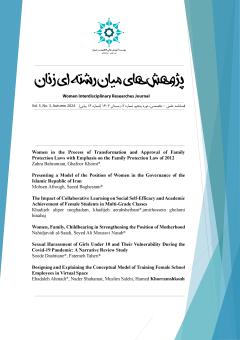Designing and Explaining the Conceptual Model of Training Female School Employees in Virtual Space
Subject Areas :Abadaleh Ah,madi 1 * , Nader Shahamat 2 , Moslem Salehi 3 , hamed khoramshokuh 4
1 - Maroodasht Branch, Islamic Azad University, Maroodasht, Iran
2 - Maroodasht Branch, Islamic Azad University, Maroodasht, Iran
3 - Maroodasht Branch, Islamic Azad University, Maroodasht, Iran
4 - Maroodasht Branch, Islamic Azad University, Maroodasht, Iran
Keywords: Training of female school employees, Virtual space, Grounded theory method.,
Abstract :
Considering the numerous challenges in online education, this research aims to compile and design a new and innovative model of virtual education. In the qualitative phase, among the qualitative research strategies, the grounded theory was used to develop a comprehensive model that includes causal factors, intervening factors, contextual factors, and conceptual model strategies for training female school employees in virtual space. Interviews were used as the primary data collection tool. Based on the obtained results, a total of 143 concepts and 21 categories or open codes were identified and extracted. The 21 identified categories were placed in the 6 main grounded data categories. Based on the results of the qualitative method, a questionnaire based on the extracted model was compiled and provided to female teachers. According to the results of the structural equation modeling of the questionnaire data, causal relationships with a factor loading of 0.435 and a T-statistic of 9.624 have a direct and significant effect on the main category. Therefore, causal conditions have a positive and significant effect on the main category. The main category, with a factor loading of 0.471 and a T-statistic of 7.734, has a direct and significant effect on strategies. The main category positively and significantly affects strategies. Strategies, with a factor loading of 0.512, affect the outcomes. Strategies have a positive and significant impact on outcomes. Intervening conditions have a direct and significant effect on the outcomes with a factor loading of 0.491. Therefore, intervening conditions positively and significantly affect the strategy. Finally, the contextual conditions, with a factor loading of 0.529, have a direct effect on the outcomes. Contextual conditions have a positive and significant effect on the strategy. In the end, the statistical validity of the model was confirmed.
1- تربتی¬نژاد، حسین؛ شاهورانی، مصطفی؛ و حجگذاری، راحله(1401). بررسی تأثیر آموزش مجازی بر یادگیری با تأکید بر راهکارهای افزایش اثربخشی. پیشرفتهای نوین در روانشناسی، علوم تربیتی و آموزش و پروش، 46، 1-10.
2- زارع، حسین؛ خانعلی¬زاده اینی، مجتبی؛ و فرخ¬فر، محمدحسین(1400). مروری بر روشهای یادگیری الکترونیکی و بهرهگیری آن در شرایط بحران کرونا. پنجمین کنفرانس ملی رویکردهای نوین در آموزش و پژوهش، محمودآباد.
3- زارعی، مائه؛ شمس، غلامرضا؛ رضایی¬زاده، مرتضی؛ و قهرمانی، محمد(1399). تعیینکنندگان اثربخشی یادگیری الکترونیکی: مطالعهای کیفی بر مدرس. فصلنامه علمی پژوهشی تدریس پژوهی، 8(2)، 55-79. doi:10.34785/J012.2020.124
4- طرخان، رضا علی؛ و مصطفوی، زینب(1400). ارائه چهارچوب مفهومی برای تسهیل روند تعامل در محیط یادگیری الکترونیکی با استفاده از روش فراترکیب. رویکردهای نوین آموزشی، 15(2)، 113-136. 10.22108/NEA.2021.116797.1365doi:
5- ملایی، لیلا(1399). طراحی آموزشی مبتنی بر شبکة اجتماعی و تأثیر آن بر رویکرد یادگیری و ادراک یادگیرندگان از محیط یادگیری. رویکردهای نوین آموزشی، 13(2)، 57-64. 10.22108/NEA.2019.106518.1133doi:
6- موسوی، سیده یلدا؛ چنانی، فاطمه؛ و درویشی، شهناز(1400). تشابه واژگانی و تمایز مفهومی (بررسی روشهای تدریس یادگیری مشارکتی و تدریس مشترک). مطالعات روانشناسی و علوم تربیتی، 7(1)، 997-1008.
7- میبودی، حامد؛ سعیدی، علی؛ و وکیلی، جواد؛ و میرسعیدی، حسین(1402). تبیین معیارها و مؤلفههای صلاحیت دیجیتال مدرسان در فضای آموزشی مدارس آینده. آموزشو پرورش متعالی، 3(3)، 12-1. 10.30495/ee.2023.1995434.1202doi:
8- Afrouz, R., & Crisp, B. R. (2020). Online education in social work, effectiveness, benefits, and challenges: A scoping review. Australian Social Work, 47(1), 1–13. doi:10.1080/0312407X.2020.1808030
9- Aldhafeeri, F. M., & Alotaibi, A. A. (2022). Effectiveness of digital education shifting model on high school students’ engagement. Education and Information Technologies, 27(5), 6869-6891. doi:10.1007/s10639-021-10879-4
10- Chen, C. Y. (2022). Immersive virtual reality to train preservice teachers in managing students' challenging behaviours: A pilot study. British Journal of Educational Technology, 53(4), 998-1024. doi:10.1111/bjet.13181
11- Chen, J., Wang, M., Kirschner, P. A., & Tsai, C. C. (2018). The role of collaboration, computer use, learning environments, and supporting strategies in CSCL: A meta-analysis. Review of Educational Research, 88(6), 799-843. doi:10.3102/0034654318791584
12- Fittipaldi, D. (2020). Managing the dynamics of group projects in higher education: Best practices suggested by empirical research. Universal Journal of Educational Research, 8(5), 1778-1796. doi:10.13189/ujer.2020.080515
13- Gokbulut, B., & Durnali, M. (2023). Professional skills training in developing digital materials through augmented and virtual reality applications. Psychology in the Schools, 60(11), 4267-4292. doi:10.1002/pits.22991
14- Mishra, L., Gupta, T., & Shree, A. (2020). Online teaching-learning in higher education during lockdown period of COVID-19 pandemic. International journal of educational research open, 1, 100012. doi:10.1016/j.ijedro.2020.100012
15- Picciano, A. G. (2017). Theories and frameworks for online education: Seeking an integrated model. Online Learning, 21(3), 166–190.
16- Singh, B., Zamaletdinov, R., Kaur, B., & Singh, J. (2022, May). Virtual professional learning for school teachers to support them in online environment. In Frontiers in Education (Vol. 7, p. 802882). Frontiers. doi:10.3389/feduc.2022.802882
17- Sofi-Karim, M., Bali, A. O., & Rached, K. (2023). Online education via media platforms and applications as an innovative teaching method. Education and Information Technologies, 28(1), 507-523. doi:10.1007/s10639-022-11188-0

